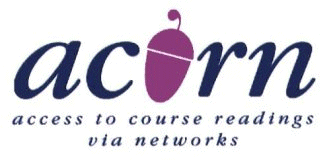ACORN
Project ACORN (Access to Course Resources via Networks) began in August 1996 and its distinguishing features are firstly the involvement of Swets & Zeitlinger (the international periodicals subscription agency) in the project consortium, and secondly its sole focus on journal articles.
The overall aim of the project is to develop a transferable model of the whole process of making short loan journal articles available electronically, and in particular to focus on the role of a third party agent in gaining copyright clearance and providing digital copies to libraries.
Permissions from publishers
As with many similar eLib projects, a first hurdle is to gain permission from publishers to make an electronic copy of their articles, and to make these available across a computer network. After hearing the experiences of several other eLib projects concerning the time required to negotiate with publishers, Project ACORN sought to reduce the numbers of publishers it might need to contact.
The project is working with the reading lists of three departments at Loughborough University - Geography, Human Sciences, and Information and Library Studies - and an initial estimate of articles on reading lists showed that we would need to contact around 250 publishers for approximately 1700 permissions.
We decided to check with lecturers which articles on their reading lists were genuinely 'high-demand', rather than just further reading, and the numbers of articles dropped dramatically. Our current estimate is that we shall need to contact around 100 publishers for permissions for approximately 700 articles.
We are hoping that publishers will make their journal articles available to us free for the life span of the project, in return for information on the usage and costs of the service. A preliminary check of the first 300 high-demand articles identified shows that Loughborough University subscribed to the hard copy original of 95% of these.
Technical strategy
 Our current plan is to use PDF (Portable Document Format) for the electronic articles, for a number of reasons, including the retention of the visual appearance of the printed original, economy in storage space compared with image files, and the availability of products to enable tailoring of facilities to local needs. This last point is very important as documents will need to be kept secure, and certain functions, such as 'cut and paste', may well need to be disabled.
Our current plan is to use PDF (Portable Document Format) for the electronic articles, for a number of reasons, including the retention of the visual appearance of the printed original, economy in storage space compared with image files, and the availability of products to enable tailoring of facilities to local needs. This last point is very important as documents will need to be kept secure, and certain functions, such as 'cut and paste', may well need to be disabled.
Articles will be made available to students via the reading list module of the TALISWeb OPAC in use at Loughborough. We are also exploring the possibility of making direct entries in the catalogue for these reading list items, and also making them available via the Library's Web pages. Whichever route the user chooses, a number of security features will be in place, including password access to documents only, and access only permitted from machines on Loughborough's network.
The articles will be held on a separate server, within a relational database management system, and will be retrieved from the database using CGI (Common Gateway Interface) scripts. They will be displayed to users via Netscape and Adobe Acrobat. The choice of commonly available tools such as these is entirely deliberate, in that the model we are developing must be transferable to other libraries.
Evaluating the Service
We plan to offer a live system to students from April 1997, and have built in a number of monitoring mechanisms. Firstly, we are gathering data on the management and usage of the paper short-loan collection, so that we have a point of comparison with the electronic service. We shall also be monitoring the reactions of students to the new service, through questionnaire and focus groups, and undertaking a human factors analysis of the use and usability of the electronic articles themselves.
To test the portability of the model developed, we shall be implementing the model at Leicester University Library, the third consortium partner, in order to assess the transferability of both the management and day- to-day procedures, as well as the technical strategy.
At the end of the project we hope to be able to report on the costs of acquiring permissions and digital copies of high-demand articles, the costs and staff time involved in managing an electronic short loan collection, the usage of the electronic service, the likely benefits to libraries of using an agent for copyright clearance, and more generally the economics of this type of service.
For further information on Project ACORN, our Web site is at:- http://liba.lboro.ac.uk/acorn/acorn.htm
…or contact Paula Kingston, Project Manager on:
01509 222366 (tel) or p.j.kingston@lboro.ac.uk(email)
